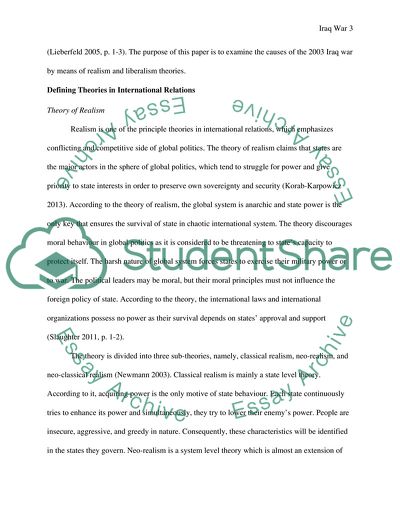Cite this document
(The Causes of the 2003 Iraq War by Means of Realism and Liberalism Coursework Example | Topics and Well Written Essays - 2000 words, n.d.)
The Causes of the 2003 Iraq War by Means of Realism and Liberalism Coursework Example | Topics and Well Written Essays - 2000 words. https://studentshare.org/politics/1879024-choose-one-inter-state-war-from-modern-history-and-explain-its-causes-using-two-theories-of-international-relations
The Causes of the 2003 Iraq War by Means of Realism and Liberalism Coursework Example | Topics and Well Written Essays - 2000 words. https://studentshare.org/politics/1879024-choose-one-inter-state-war-from-modern-history-and-explain-its-causes-using-two-theories-of-international-relations
(The Causes of the 2003 Iraq War by Means of Realism and Liberalism Coursework Example | Topics and Well Written Essays - 2000 Words)
The Causes of the 2003 Iraq War by Means of Realism and Liberalism Coursework Example | Topics and Well Written Essays - 2000 Words. https://studentshare.org/politics/1879024-choose-one-inter-state-war-from-modern-history-and-explain-its-causes-using-two-theories-of-international-relations.
The Causes of the 2003 Iraq War by Means of Realism and Liberalism Coursework Example | Topics and Well Written Essays - 2000 Words. https://studentshare.org/politics/1879024-choose-one-inter-state-war-from-modern-history-and-explain-its-causes-using-two-theories-of-international-relations.
“The Causes of the 2003 Iraq War by Means of Realism and Liberalism Coursework Example | Topics and Well Written Essays - 2000 Words”. https://studentshare.org/politics/1879024-choose-one-inter-state-war-from-modern-history-and-explain-its-causes-using-two-theories-of-international-relations.


